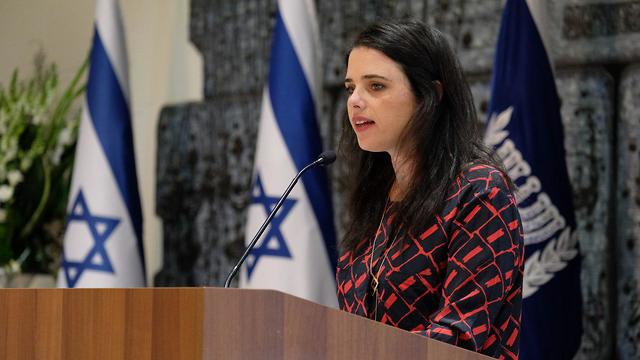
The bill proposal will be presented in a first reading before the end of the current Knesset session, Shaked informed her listeners, who cheered in response.
Additionally, people who commit the same offense within three years of the first time will be ordered to pay a fine of NIS 3,000. Those given the fine would have the chance to pay it, appeal it or to submit a request to stand trial . If the court rules against the defendant, the fine could go up to NIS 14,000.
The law would apply to adults paying for sexual services since minors’ prostitution is already qualified as a criminal offense in Israel. The justice minister, with the agreement of Welfare and Social Services Minister Haim Katz, would be able to decide on an alternative punishment to a fine, such as ordering the offender to participate in therapeutic-educational workshops.
The Memorandum of Law will be implemented as a temporary measure for five years, and will be accompanied by a research project designed to ascertain its level of effectiveness and implementation.
Shaked pointed out that the memo, in her view, is not the main issue when it comes to resolving the problem of prostitution and is only part of a wider governmental decision and process which is to be advanced in the upcoming months.
The program aims to deal with two main issues: the expansion of psychological and physical treatment options for not only those employed in the industry but also for costumers as well; creating a rehabilitation program for women in the industry that will include psychological help as well as financial and employment assistance.
A program, locating and preventing the establishment of “shelter apartments” for prostitutes and rehab centers and sex clinics for populations prone to dangerous lifestyles such as drug addiction and prostitution, will involve government activity that intends to minimize the scale of the industry and to offer treatment to its clientele.
The second issue is raising public awareness regarding the characteristics, risk factors and the detrimental effects of the prostitution industry by creating relevant educational content for children in schools, emphasizing healthy sexuality and adding content which would help education professionals to identify minors likely to be exploited by the prostitution industry.
Authorities will also boost educating to soldiers and students about the dangers of being employed in the industry and using its services. Additionally, public campaigns will be launched on the issue.
Mandatory coaching for those in professions with potential links to prostitution will also be explored as part of the solution, as will advertising about how and where to receive assistance and rehabilitation for people still in the industry.
The Chairman of the Subcommittee on Combating Trafficking in Women and Prostitution MK Aliza Lavie (Yesh Atid) described he day on which Shaked announced the memorandum as "a holiday."
"We’re standing in front of an opportunity to take a historic step forward for thousands of women, girls and boys trapped in the industry and for the society as a whole," she said. "This is a critical point in time since the promotion of this law is important not only with regards to its immediate effects, but also regarding its subsequent promotion due to the rule of continuity."
The Chairman of the Jewish Home faction MK Shuli Mualem said that “this Memorandum of Law is an obvious statement of Israel that’s Jewish, ethical, moral, social and it contains within itself the deconstruction of the needs of the industry and the rehabilitation of those who are still stuck in it.
Lawyer Nitzan Kahane, a managing partner in the campaign against “Trafficking in Women and Prostitution”, also offered her congratulation. “Israel today took a very important step on the way to stopping the exploitation of the oldest profession. Publication of this memo is good news for almost 14,000 women in the industry," she said.
“After a decade-long struggle, it seems as if there is a real commitment from the state on this issue,” exclaimed Kahane. She also added that alongside the bill proposal, it is worth investing in rehabilitation treatments for thousands of women in prostitution “that would be serious and effective and not based on ridiculous budgets and charities.”
Kahane also proposed that “those who meet young women in despair wouldn’t treat them like pimps. The time has come for the country to be held responsible for educating the public on this important issue and say: We’re putting an end to the exploitation of women.”
Shaked also hailed the announcement. “Today we’re sending a message—trafficking in women and prostitution are off limits. Paying for sex is immoral and it objectifies the bodies of women in Israel. There’s no reason the women in our society should be abandoned.
“The treatment of prostitution should be much more widespread, and that's what we’ll be working on in the upcoming months. I want to thank MKs Shuli Mualem and Aliza Lavie for leading the charge on this issue over the past years,” added the justice minister.
The inter-ministerial team, headed by Ministry of Justice Director General Emi Palmor, submitted five months ago its final report investigating the tools which would help minimize the number of people paying for sex.
Although the report did not seek to criminalize clients, it concluded the criminalization of the clients is justified sdue to the severe distress caused to the women in the industry.
However, the team determined that “criminal punishment of customers should be used as a last resort.” The report concludes that before resorting to criminal means, there should be first and foremost an educational process in order to raise the public’s awareness.
Also last July a “National Struggle Against the Consumption of Prostitution and the Provision of Assistance to Prostitutes” bill proposal was passed in a preliminary hearing and had been written by MKs Shuli Mualem and Zehava Gal-On (Meretz).
A parallel bill proposal by the Yesh Atid MK Aliza Lavie was also passed unanimously, with more than 70 supporters and no opposing or abstaining votes.


















